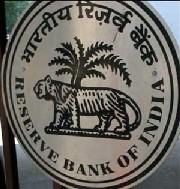The government said the Reserve Bank of India is following a good policy of not interfering in the forex market even when the rupee breached the Rs 48 per US dollar-mark in early trade on Wednesday.
 "RBI has been following a good policy. These are the ways of correcting international imbalances," Department of Economic Affairs Secretary R Gopalan said on the sidelines of a seminar organised by ICRIER in New Delhi.
"RBI has been following a good policy. These are the ways of correcting international imbalances," Department of Economic Affairs Secretary R Gopalan said on the sidelines of a seminar organised by ICRIER in New Delhi.
"As far as the Indian economy is concerned, I have a feeling that the RBI is following a good policy of not interfering, but the point is that once it goes beyond a point, we need to look at how we can manage," he said.
The Indian rupee tumbled to nearly a 2-year low of Rs 48.01 against the American currency in early trade today on persistent dollar demand from banks and importers in view of dollar firmness in overseas markets.
The fall in the rupee is making imports, including
petroleum products, costlier, while exports have become more attractive.
Gopalan further said: "It (exchange rate management) still remains in the RBI's domain, their sphere and they know what right action to take. It could be a short-term disruption and I don't think that we need to give up our policy for short-term disruptions."
On monetary policy, he said RBI takes all factors into consideration before they take a view and their judgement is final.
The RBI is scheduled to conduct a mid-quarterly review of the monetary policy on September 16. It is widely expected that the central bank will raise rates further in its bid to tame inflation.
Since March, 2010, RBI has raised the key policy rates 11 times to fight the menace of price rise.
Asked whether BRIC nations, including India, will buy European debt to support the faltering euro zone, he said, "Idea has been thrown open by the Brazilian minister, the BRIC finance ministers will take a call when they meet on September 22."
© Copyright 2025 PTI. All rights reserved. Republication or redistribution of PTI content, including by framing or similar means, is expressly prohibited without the prior written consent.

 "RBI has been following a good policy. These are the ways of correcting international imbalances," Department of Economic Affairs Secretary R Gopalan said on the sidelines of a seminar organised by ICRIER in New Delhi.
"RBI has been following a good policy. These are the ways of correcting international imbalances," Department of Economic Affairs Secretary R Gopalan said on the sidelines of a seminar organised by ICRIER in New Delhi.